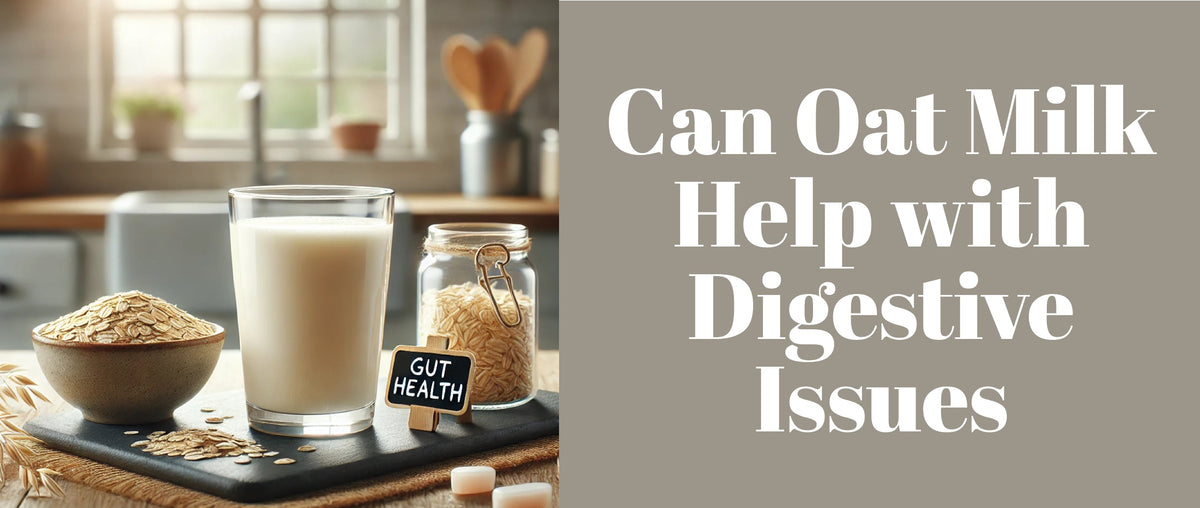Can Oat Milk Help with Digestive Issues
As a growing number of people embrace plant-based diets and seek dairy-free alternatives, oat milk has surged in popularity due to its nutritional benefits and creamy texture. One of the biggest questions around oat milk is its impact on digestion: Can oat milk actually aid digestive health? Understanding how oat milk affects digestion involves examining its nutritional profile, benefits for common digestive issues, and how it compares to other plant-based milk options. This article will dive into the potential digestive benefits of oat milk and discuss why it could be a valuable addition to your healthy lifestyle.
Key Takeaways
- Oat milk is rich in fiber and can support regular digestion.
- Beta-glucan, a type of soluble fiber found in oats, may promote a healthy gut and even lower cholesterol.
- While oat milk can benefit many people, those with gluten sensitivities or sensitive stomachs should choose carefully and consider how oat milk affects them individually.
Nutritional Profile of Oat Milk
Understanding Oat Milk’s nutritional profile sheds light on its benefits for digestion. It’s loaded with essential nutrients that make it an attractive alternative to dairy milk, particularly for those with lactose intolerance or looking for Vegan products. Let’s look at what nutrients are found in oat milk and how they support digestive health.
Key Nutrients in Oat Milk
| Nutrient | Benefits for Digestion | Average Content (per 1 cup) |
|---|---|---|
| Fiber (Beta-Glucan) | Aids digestion and promotes a healthy gut biome | 2–4 grams |
| Calcium | Supports digestive enzymes | 25–35% DV |
| Vitamin D | Enhances gut function and immune response | 20–25% DV |
| Iron | Prevents fatigue by supporting oxygen flow | 10–15% DV |
| B Vitamins | Essential for energy and metabolic processes | 15–20% DV |
Beta-glucan, a soluble fiber in oat milk, is a standout nutrient for digestion. Beta-glucan not only supports gut health by feeding beneficial gut bacteria but also helps keep bowel movements regular. Studies indicate that beta-glucan can also reduce inflammation in the digestive tract, which can be beneficial for people with conditions like irritable bowel syndrome (IBS).

Comparison with Other Plant-Based Milks: Compared to almond milk, soy milk, and coconut milk, oat milk typically contains more fiber. This additional fiber content is particularly advantageous for those looking to improve digestion, regulate blood sugar, and lower cholesterol naturally.
How Oat Milk Impacts Digestive Health
Oat milk offers multiple digestive health benefits due to its high fiber content, low allergen profile, and nutrient-dense properties. Here’s a closer look at how oat milk impacts digestion and why it’s a good choice for individuals seeking healthy living options.
- Fiber Content: Oat milk’s high beta-glucan content makes it an excellent choice for those looking to support healthy digestion and healthy weight loss. Fiber aids in maintaining regular bowel movements and can alleviate constipation, a common digestive issue.
- Prebiotic Properties: Oat milk’s fiber acts as a prebiotic. This means it provides food for the beneficial bacteria in the gut, promoting a balanced gut microbiome, which is essential for a healthy immune system, efficient digestion, and overall well-being. A balanced gut can support overall healthy lifestyle choices.
- Low FODMAP Content: FODMAPs are a group of short-chain carbohydrates that can be difficult for some people to digest, leading to bloating and discomfort. Oat milk is considered lower in FODMAPs than many other milk options, making it a suitable choice for people with irritable bowel syndrome (IBS) or those prone to digestive sensitivities.
Table: Digestive Benefits of Oat Milk vs. Dairy Milk
| Feature | Oat Milk | Dairy Milk |
|---|---|---|
| Fiber | High in beta-glucan fiber | None |
| Digestive Enzymes Needed | Minimal for digestion | Requires lactase |
| Gut Health | Supports prebiotics and gut flora | Can cause digestive issues |
| Anti-Inflammatory Effects | Reduces gut inflammation | Often pro-inflammatory |
| Allergen-Free Options | Available (gluten-free options) | Contains lactose |
Benefits of Oat Milk for Common Digestive Issues
1. Promotes Regular Bowel Movements
Oat milk is rich in soluble fiber, primarily in the form of beta-glucan. Soluble fiber absorbs water and adds bulk to stools, which helps maintain regular bowel movements. This property can be particularly beneficial for people who struggle with constipation. Since beta-glucan forms a gel-like substance in the gut, it also slows down digestion, which improves nutrient absorption and helps regulate blood sugar levels, supporting healthy living and healthy weight loss.
2. May Reduce Gut Inflammation
Oat milk's beta-glucan content has been shown to have anti-inflammatory effects. Inflammation in the gut can disrupt digestive function and even damage the gut lining, leading to conditions like leaky gut syndrome. Beta-glucan has been studied for its ability to reduce inflammatory markers in the digestive tract, which is essential for individuals with conditions like ulcerative colitis and Crohn's disease. Reducing inflammation supports overall healthy lifestyle practices and can contribute to healthy weight loss by promoting gut balance.
3. Potential Relief for Acid Reflux
People with acid reflux often look for dairy-free alternatives to avoid triggering symptoms. Oat milk has a mild, neutral pH level, which may be less likely to aggravate acid reflux symptoms compared to high-fat or highly processed foods. Additionally, oat milk’s fiber content can help coat the stomach and reduce acid production. While not a cure, it’s a great option for those who need a gentle, plant-based milk to complement other liver healthy foods and a healthy lifestyle.
4. Supports Beneficial Gut Bacteria
As a source of prebiotics, oat milk encourages the growth of beneficial gut bacteria. Prebiotics act as food for probiotics, the good bacteria that maintain gut health. By including prebiotic-rich foods like oat milk in your diet, you can support a thriving gut microbiome, which is linked to improved digestion, mood stability, and immune response.
Table: Oat Milk Benefits for Digestive Issues
| Digestive Issue | How Oat Milk Helps | Key Nutrient/Property |
|---|---|---|
| Constipation | Adds bulk to stools, regulates movements | Fiber (beta-glucan) |
| Irritable Bowel Syndrome | Low FODMAP, gentle on the digestive system | Low FODMAP content |
| Gut Inflammation | Reduces inflammation, strengthens gut lining | Anti-inflammatory beta-glucan |
| Acid Reflux | Neutral pH, fiber coats stomach | Neutral pH and fiber |
| Imbalanced Gut Microbiome | Feeds good bacteria, promotes gut health | Prebiotic properties |
By helping manage these digestive issues, oat milk supports a balanced diet and enhances healthy living. If you’re looking for additional dairy-free choices, try vegan cheese options like plant based cheese or vegan butter for cooking, which complement a gut-friendly diet.
Who Might Experience Digestive Problems with Oat Milk?
While oat milk has multiple digestive benefits, some people may experience digestive discomfort, especially if they are sensitive to certain ingredients commonly added to commercial oat milk. Here’s a closer look at who might need to exercise caution:
1. Gluten Sensitivity and Cross-Contamination
Most oat milk on the market is processed in facilities that may not be gluten-free. People with celiac disease or gluten intolerance need to be vigilant and opt for gluten-free certified oat milk to avoid potential digestive symptoms like bloating, gas, and stomach cramps. For those sensitive to gluten, cross-contamination in non-certified oat milk can trigger symptoms similar to consuming gluten itself.
2. Added Sugars and Artificial Ingredients
Some oat milk brands contain added sugars, gums, and emulsifiers, which can contribute to digestive discomfort. Ingredients like carrageenan, guar gum, and other thickeners may cause bloating, gas, and diarrhea in sensitive individuals. It’s best to select unsweetened and minimally processed oat milk for easier digestion and to support a healthy lifestyle. You can also explore brands that offer fat-free butter or Unprocessed Cheese options, as these tend to be free from digestive irritants as well.
3. Risk of Bloating and Gas
Due to its fiber content, oat milk can sometimes cause bloating and gas if consumed in large quantities, especially for individuals who are not used to high-fiber diets. This issue is often temporary as the body adjusts to a higher fiber intake. Starting with smaller amounts and increasing gradually can help prevent bloating, allowing you to enjoy the digestive benefits of oat milk without discomfort.
4. Can Oat Milk Cause Diarrhea?
Excessive consumption of oat milk or certain additives may lead to diarrhea in some people. According to The Real Gut Doctor source, this could be due to high fiber intake or reactions to stabilizers and sweeteners used in oat milk. To minimize this risk, choose a simple, additive-free oat milk brand and monitor your individual tolerance.
Tips for Choosing Digestive-Friendly Oat Milk
- Opt for Unsweetened Varieties: Sugars can aggravate digestive issues in some people.
- Choose Gluten-Free Certified Oat Milk: Essential for those with gluten intolerance.
- Read the Ingredient List: Avoid oat milks with added thickeners or gums.
- Consider Homemade Oat Milk: Making oat milk at home allows you to control the ingredients and avoid common additives.
How to Choose the Best Oat Milk for Digestive Health
Choosing the right oat milk is essential for supporting digestion and avoiding common issues like bloating or discomfort. With a growing variety of oat milk products available, some are better suited for gut health than others. Here are essential factors to consider when selecting digestive-friendly oat milk:
1. Look for Organic and Simple Ingredients
Many commercial oat milk brands add preservatives, artificial sweeteners, and thickening agents that can negatively impact digestion. To avoid this, choose organic oat milk with minimal ingredients. Organic options often contain fewer pesticides and additives, making them gentler on the stomach.
2. Check for Gluten-Free Certification
For those with gluten sensitivity or celiac disease, it's important to choose oat milk that is certified gluten-free. Though oats are naturally gluten-free, they’re frequently processed in facilities that handle gluten, leading to cross-contamination. Certified gluten-free oat milk ensures that the product is safe for those with gluten intolerance.
3. Avoid Added Sugars and Gums
Sugar and gums, often added to enhance flavor and texture, can cause digestive discomfort in some individuals. Look for unsweetened oat milk with no added gums like carrageenan or guar gum, as these ingredients are known to trigger bloating and gas. Selecting simple, clean-label oat milk varieties supports healthy living and reduces the risk of gut-related issues.
4. Consider Homemade Oat Milk for Optimal Control
If you want full control over ingredients, homemade oat milk is an easy and economical option. Simply blend oats and water, strain, and enjoy a fresh, natural version of oat milk. Making oat milk at home also allows you to add other liver-healthy foods like turmeric or ginger for an extra boost to digestion.
Table: What to Look for in Digestive-Friendly Oat Milk
| Feature | Benefit for Digestion | Example Label Check |
|---|---|---|
| Organic Ingredients | Fewer additives and pesticides | Certified Organic |
| Gluten-Free Certified | Safe for those with gluten intolerance | Gluten-Free Certified |
| No Added Sugars or Gums | Minimizes risk of bloating or gas | Unsweetened |
| Minimal Ingredients | Reduces chances of digestive irritation | Only Oats and Water |
| Homemade Option | Full control over ingredients, additive-free | N/A |
Comparing Oat Milk to Other Milk Alternatives for Digestion
While oat milk has unique benefits for digestion, other plant based milks—such as almond milk, soy milk, and coconut milk—also offer digestive benefits. Here’s a breakdown of how these alternatives compare in terms of digestive health:
1. Almond Milk
Almond milk is generally low in calories and free from lactose, making it gentle on digestion. However, almond milk contains minimal fiber, so it lacks the prebiotic benefits found in oat milk. It’s also low in protein, which may be a concern for those seeking a high-nutrient milk alternative. Almond milk’s smooth texture makes it ideal for recipes like healthy smoothie recipes, which can be a great addition to a healthy lifestyle.
2. Soy Milk
Soy milk has a higher protein content than oat milk, which can help promote satiety and support digestive enzymes. However, soy can be harder for some people to digest due to natural compounds called oligosaccharides, which may cause gas and bloating. Soy milk is a good option for those who can tolerate soy but may not be ideal for individuals with sensitive stomachs.
3. Coconut Milk
Coconut milk has a creamy texture and is high in medium-chain triglycerides (MCTs), a type of fat that can provide quick energy. While coconut milk is low in fiber, MCTs are easier to digest than other fats, making coconut milk a good choice for people with fat-sensitive digestive systems. However, coconut milk lacks the prebiotic fiber present in oat milk, so it may not support gut health as effectively.
Comparison Table: Digestive Health Benefits of Plant-Based Milks
| Plant-Based Milk | Key Digestive Benefit | Potential Drawback | Ideal Use |
|---|---|---|---|
| Oat Milk | High fiber (beta-glucan), prebiotic | May contain gluten or additives | Gut health, smoothies, lattes |
| Almond Milk | Low-calorie, lactose-free | Low fiber, low protein | Healthy weight loss, smoothies |
| Soy Milk | High protein, lactose-free | Can cause gas, high FODMAP | Healthy lifestyle diets |
| Coconut Milk | Easily digestible fats (MCTs) | Low fiber, high fat | Creamy dishes, energy shakes |
Tips for Incorporating Oat Milk into a Digestive Health Routine
Adding oat milk to your daily routine is easy and can support better digestion and overall healthy living. Here are practical ways to incorporate oat milk for digestive benefits, along with additional food pairings and recipes for a liver-healthy diet.

1. Pair with Digestive-Friendly Foods
For maximum digestive support, try pairing oat milk with other fiber-rich and anti-inflammatory foods. For example:
- Smoothies: Combine oat milk with low-calorie fruits like berries and spinach for a healthy smoothie recipe that’s fiber-packed and promotes gut health.
- Overnight Oats: Soak oats in oat milk with chia seeds, berries, and a drizzle of cashew butter. This combination delivers fiber, omega-3s, and antioxidants, making it a powerful choice for digestion.
- Lattes and Teas: Swap out dairy milk for oat milk in lattes and herbal teas. Many people find that using oat milk in tea or coffee is easier on their stomach, especially with drinks like ginger or chamomile tea that already support digestion.
2. Start with Small Quantities
If you’re new to oat milk or have a sensitive digestive system, start with small amounts and increase gradually. This approach allows your body to adjust to the fiber content and reduces the risk of initial bloating or discomfort.
3. Use Oat Milk in Cooking and Baking
Oat milk can easily substitute for dairy milk in recipes like soups, sauces, and baked goods. Using oat milk in cooking helps ensure that you receive its digestive benefits even in savory dishes. Oat milk works well in baking recipes for healthy weight loss and can also pair nicely with Unsalted Butter, Garlic Butter, or vegan butter for those following a plant-based lifestyle.
4. Choose Quality Oat Milk Brands
Selecting high-quality, additive-free oat milk is key for digestive health. Brands that are gluten-free certified and unsweetened offer the best options for digestion. If you prefer a more customized version, making homemade oat milk ensures full control over ingredients.
Table: Simple Ways to Add Oat Milk for Digestive Health
| Method | Digestive Benefit | Example Recipe Idea |
|---|---|---|
| Smoothies | High fiber, supports regularity | Berry smoothie with spinach and oats |
| Overnight Oats | Fiber-rich, prebiotic support | Oat milk, chia seeds, berries, nuts |
| Cooking and Baking | Easier on digestion, versatile for many dishes | Creamy soup, pancake batter, sauces |
| Herbal Lattes/Teas | Soothing, less acidic than dairy milk | Oat milk with turmeric, chamomile tea |
Conclusion: Is Oat Milk Good for Digestive Health?
In summary, oat milk offers multiple benefits for those seeking to improve digestive health while enjoying a delicious, dairy-free milk option. Its high fiber content, prebiotic properties, and anti-inflammatory benefits make it ideal for people with common digestive concerns like constipation, bloating, and acid reflux.
By choosing quality oat milk and incorporating it into meals thoughtfully, you can support a balanced gut microbiome and enjoy the digestive benefits of this versatile, plant-based milk. However, individuals with gluten intolerance should always select gluten-free certified oat milk to avoid potential irritation.
As part of a healthy lifestyle, oat milk can complement other vegan products and plant based cheese options to round out a diet focused on digestive and overall health. Experiment with homemade oat milk, smoothie recipes, and oat milk-based lattes for a gut-friendly twist on your daily routine.
Do you enjoy vegan food? We have a list of vegan restaurants in India to help you find delicious options in your area!










